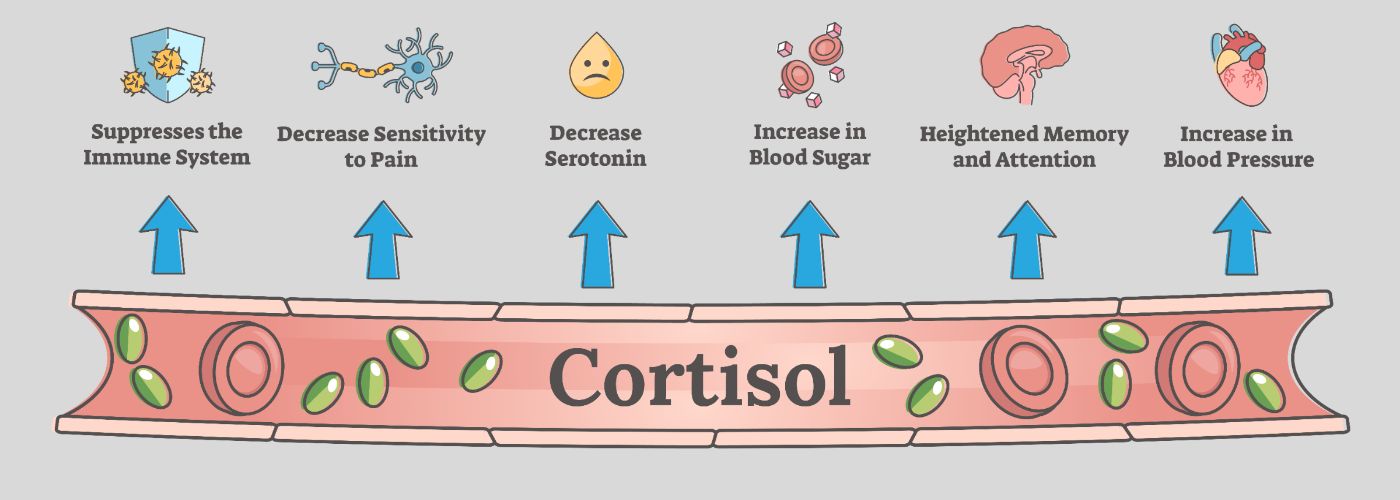We all know the feeling of being stressed and overwhelmed. Unfortunately, cortisol levels can quickly start to rise in this situation leading to serious health complications. It’s essential that we are proactive in managing our cortisol levels. In this blog, we’ll explore some best practices for limiting cortisol levels to better your wellness!
What Does Cortisol Do?

Cortisol is a hormone that plays a vital role in regulating various bodily functions. It is commonly known as the “stress hormone” because it is released in response to stress. Cortisol levels naturally fluctuate throughout the day, with higher levels in the morning and lower levels at night.
One of cortisol’s primary functions is to increase blood sugar levels. It does this by stimulating glucose production in the liver and inhibiting glucose uptake by muscle tissue. This process ensures that there is enough energy available for the body to respond to stress or carry out physical activity.
Cortisol also affects the immune system, particularly during times of prolonged stress. While short-term cortisol release can help boost immunity, chronic exposure to high cortisol levels can suppress immune function, leaving individuals more susceptible to illness and infection.
Additionally, cortisol can affect mood, appetite, and sleep patterns when present at sustained high levels over time. This is why it’s recommended to live a content life to limit excess cortisol levels. This is done by limiting activities that can cause unnecessary stress.
How Do I Lower My Cortisol Levels?

Cortisol is a hormone produced by the adrenal gland in response to stress. High cortisol levels can lead to various health problems like weight gain, anxiety, and high blood pressure. Thankfully, there are several ways to lower cortisol levels and improve overall well-being.
One way to lower cortisol levels is through regular exercise. Exercise promotes the release of endorphins that reduce stress and anxiety symptoms while increasing feelings of happiness and relaxation.
Another effective technique for reducing cortisol is mindfulness meditation or deep breathing exercises, which have been shown to decrease stress hormones in the body.
Maintaining a healthy diet also plays an important role in reducing cortisol levels. Consuming foods rich in omega-3 fatty acids, such as fish or walnuts, has been linked with reduced levels of cortisol as well as increased brain function and heart health.
Can Cortisol Cause Weight Gain?

Cortisol is a hormone secreted by the adrenal gland in response to stress. It plays an essential role in regulating our body’s metabolism and immune response. However, when cortisol levels remain elevated for extended periods due to chronic stress, it can result in various health problems, including weight gain.
One way that cortisol can lead to weight gain is by increasing appetite and cravings for high-calorie foods. Cortisol activates the release of glucose into the bloodstream, which provides energy for the body’s fight-or-flight response during stressful situations.
However, if this glucose remains unused, it gets stored as fat, leading to weight gain.
Another way cortisol causes weight gain is by promoting the accumulation of abdominal fat. This type of fat is particularly dangerous as it increases inflammation in the body and increases the risk of heart disease and diabetes. This is why maintaining a healthy diet full of vitamins, minerals, antioxidants and nutrient-dense foods is important.
How To Test For Cortisol Levels?
The most common way to test for cortisol levels is through blood tests. A healthcare professional will draw your blood at specific times throughout the day to measure your cortisol levels accurately.
Another way to test for cortisol is through saliva tests which are more convenient and less invasive compared to blood tests. Saliva samples can be collected at home and sent off for lab analysis.
Urine tests are another option when it comes to testing for cortisol levels. Urine tests have been used mainly in research studies and may not be readily available in clinical settings.


Latest from our blog
How to Practice Mindfulness Daily
Are you often overwhelmed by the chaos of daily life, wishing you could find a
Feb
How To Use Feng Shui With Negative Ion Jewelry
Imagine walking into your home and instantly feeling a sense of calm wash over you.
Jan
Are Negative Ions More Powerful in Winter?
Negative ions, often known for their refreshing effects on mood and energy, have garnered interest
Dec
Best Times & Places For Natural Negative Ions
In this article, we’ll explore the best times & places for natural negative ions—from sunlit
Nov